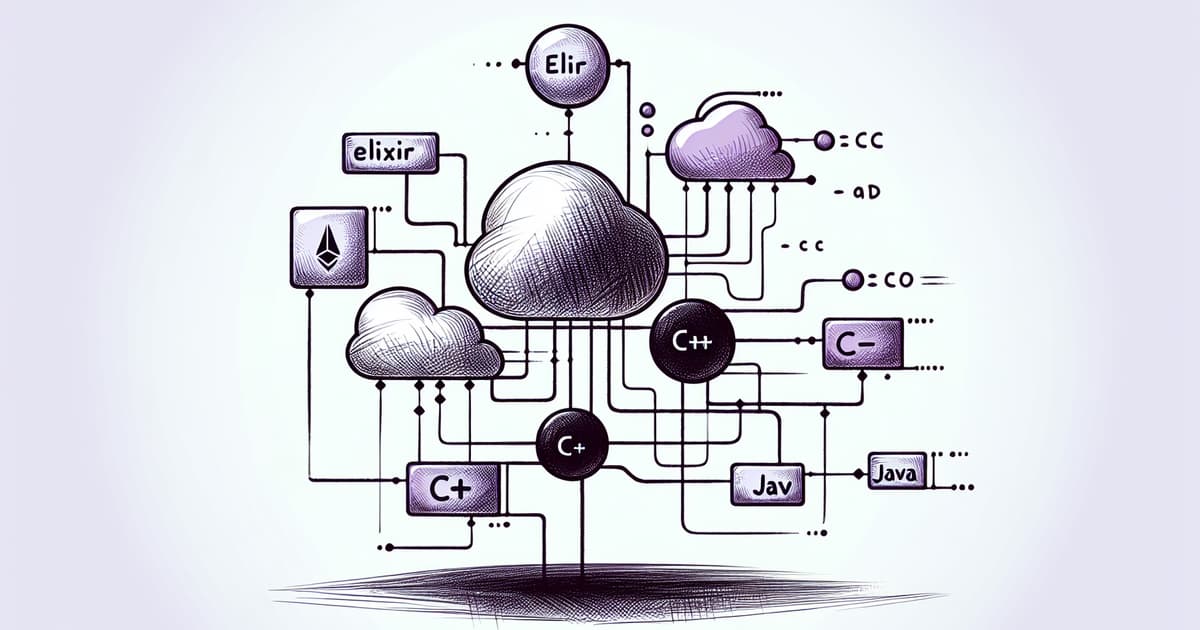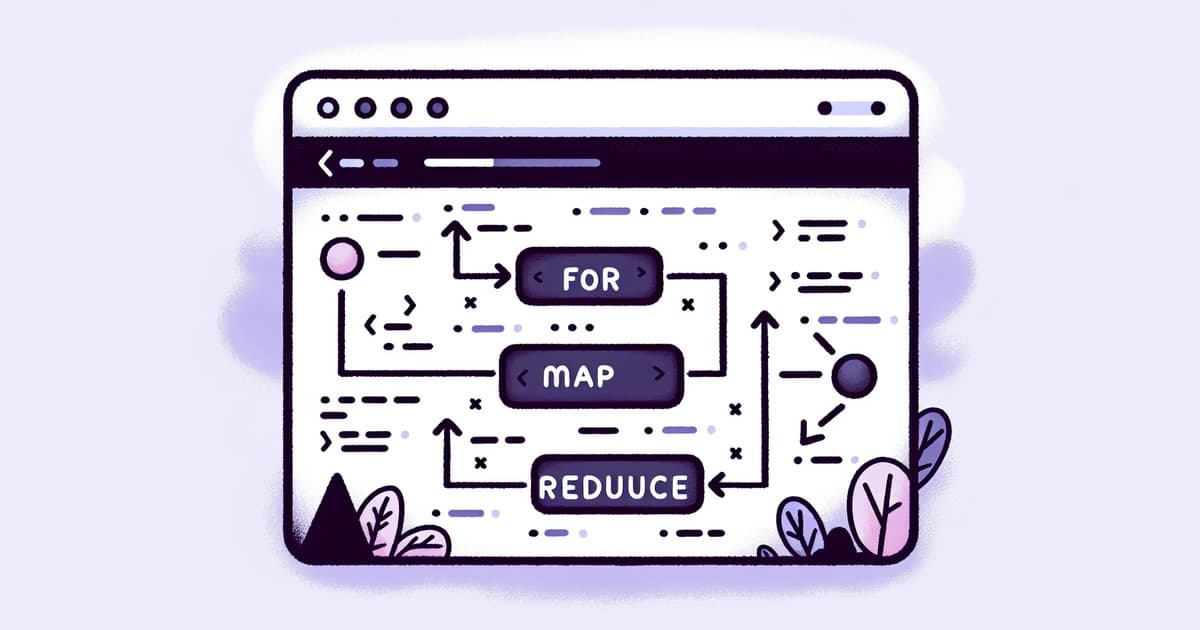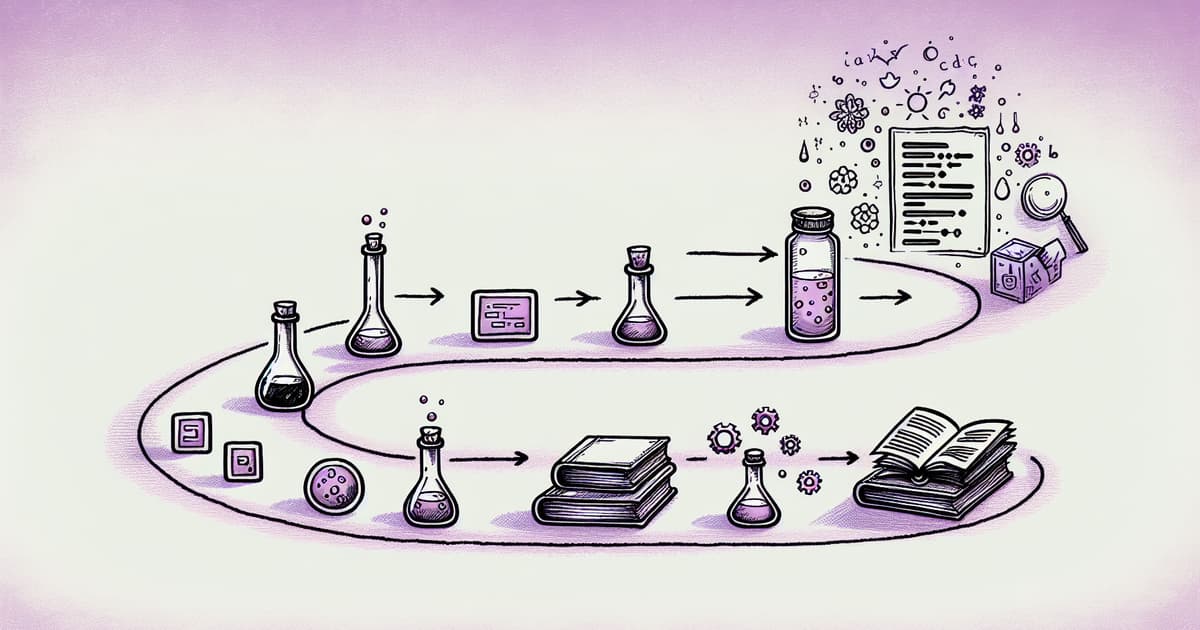We can't find the internet
Attempting to reconnect
Something went wrong!
Hang in there while we get back on track
Functional Programming

Elixir stands as a dynamic, functional programming language designed for building scalable and maintainable applications. By favoring a functional programming paradigm, it allows developers to write code that is concise, predictable, and easy to test. Developers transitioning from imperative and object-oriented languages like JavaScript or Ruby are often struck by Elixir's elegant syntax and powerful features, such as its robust concurrent processing capabilities.
The language is built on the Erlang VM (BEAM), which gives it access to the powerful concurrency model and fault tolerance for which Erlang is known. The BEAM VM's ability to efficiently handle thousands of processes simultaneously makes Elixir an excellent choice for building high-performance, distributed server-side applications. One of Elixir's most distinctive features is its support for immutable data structures, which ensures that data remains unchanged as it flows through the system, reducing side effects and increasing reliability.
Elixir also boasts a vibrant ecosystem, with frameworks like Phoenix for web development, which includes features like LiveView for real-time communication in web apps. The language offers robust tooling for software development such as the mix build tool, the Hex package manager, and the ExUnit testing framework, all designed to provide a delightful experience for developers. Its metaprogramming capabilities allow for writing code that writes code, enabling high reusability and further reducing boilerplate.
Educational resources, podcasts, and community talks available to Elixir developers cover a wide gamut of topics, from deep learning to embedded systems development. The language's approachable syntax and powerful features, coupled with the thriving community and extensive resources, ensure that both new and experienced programmers can discover and harness the joys and efficiency of functional programming with Elixir.

Panel Discussion on Utilizing Elixir in Projects
Hosts Adi Iyengar, Allen Wyma, and Sascha Wolf share insights on their recent Elixir projects, challenges, and discoveries.

Elixir Developer Experiences and AI in Elixir
In this episode of 'Elixir Mix,' the panelists Adi Iyengar, Allen Wyma, and Sascha Wolf discuss their recent experiences and challenges while working on Elixir projects and the value of AI in the Elixir ecosystem.

ElixirConf 2023 Behind the Scenes Insights
This episode of Beam Radio provides listeners with exclusive behind-the-scenes interviews from ElixirConf 2023, featuring conversations with several key community members.

Beam Radio discusses Membrane with lead architect Mateusz Front
Mateusz Front, a lead architect at Membrane, talks with the Beam Radio panel about the innovative work happening with BEAM technologies at Membrane.

Elixir Apprenticeships - Beam Radio Episode 43
Andrew Ek and Chris Nelson discuss the benefits and patterns of Elixir apprenticeships on Beam Radio.

Preview of Elixir Conference Episode
This episode of Beam Radio delves into what to expect at the upcoming Elixir Conf. It features discussions and insights from various hosts involved in the Elixir community, as well as information about their sponsors, Groxio and Underjord.

Discussion on Nerves with Alex McLain
The BeamRadio panel converses with Alex McLain about Nerves and learning in the context of the BEAM ecosystem.

Reflecting on Chris McCord's LiveView Keynote with the BeamRadio Team
The BeamRadio team discusses Chris McCord's keynote on LiveView from ElixirConf 2022 and offers a discount code for CodeBeam tickets.

Discussion of Elixir Projects and Community Engagement
This episode of Beam Radio features a conversation with hosts Steven and Lars, including discussions about Elixir projects and how to engage with the community.

Beam Radio Podcast: Bruce's Adventures and Elixir Resources
This episode features various resources and announcements for Elixir developers, including a mention of the upcoming GigCityElixir conference.

Discussion on Nerves and Puppeteering with Flora Petterson
Flora Petterson, technical writer and puppeteer, shares her experience on using the Nerves project platform for animating puppets.

Interview with José Valim on Beam Radio
José Valim talks to Beam Radio about Elixir, and the show welcomes new host Meryl Dakin.

Exploring Elixir's Unique Features with Dave Lucia
Dave Lucia discusses the distinctive capabilities of Elixir and the vibrancy of its community.

Insights on Observability in Elixir
The BeamRadio Panel delves into observability within the Elixir ecosystem in their 50th episode. Attend GigCityElixir and Empex NYC conferences to connect with the Elixir community.

Discussion with Paul Dawson on Genserver.social and GigCityElixir
Paul Dawson discusses his work on Genserver.Social in an engaging conversation with the Beam Radio team.

Discussion on 'Elixir In Action' with Saša Jurić
Saša Jurić talks about the 3rd edition of 'Elixir In Action' on Beam Radio, discussing Elixir teaching and programming practices.

Discussing Elixir Security with Michael Lubas on Beam Radio
In this episode of Beam Radio, the panel engages with Paraxial founder Michael Lubas to delve into security aspects of the Elixir programming language.

Transitioning from Ruby to Elixir Discussion with Steve Bussey
Steve Bussey discusses language adoption and the transition from Ruby to Elixir on BeamRadio.

Discussing the Nerves Project in Elixir with Frank Hunleth
Frank Hunleth discusses his experiences with the Nerves Project and its applications in Elixir.

Understanding Erlang's 'let it crash' philosophy
Adolfo Neto discusses the 'let it crash' philosophy in Erlang for handling errors, reflecting on the ideas of Joe Armstrong, one of the creators of Erlang.

Understanding Code Shepherding in Elixir
Amos King delivers a talk on 'The Importance of Shepherding' at GigCityElixir 2023. He emphasizes the value of shepherding in software development.

Innovative Software Development with Managed Risk
Stephen Bussey presents on taking calculated risks in software development with a focus on Elixir. He discusses the importance of innovation, risk management, and provides insights into software architecture.

Improving Healthcare Outcomes with Elixir's Actor Model
Bryan Hunter discusses HCA's Waterpark, a powerful distributed system built with Elixir, focusing on its development and significant impact on healthcare.

Functional Package Management and Deployment with Nix
Vaibhav Sagar discussed the challenges of software deployment post-release and presented a solution using the Nix suite of tools to streamline functional DevOps processes.

Understanding Elixir's Metaprogramming
Adrian Cruz presents a comprehensive talk on metaprogramming with Elixir, sharing insights from his experience working at Teachers Pay Teachers.

Understanding and Optimizing Functional Data Structures in Elixir
Zack Kayser presents on reasoning about data structures and runtimes in Elixir compared to imperative languages. Kayser emphasizes the implications of working with immutable data structures and their efficiency in Elixir.

Structured Program Design in Elixir with Bruce Tate
Bruce Tate speaks about layered program design in Elixir, emphasizing the mental model of 'Do Fun Things with Big, Loud Worker Bees', which represents the concepts of Data, Functions, Tests, Boundaries, Lifecycles, and Workers.

Enhancing Real-Time Interactivity with LiveView and User Experience Design
Zack Kayser and Beau Heubach, from Gaslight, discuss the integration of user experience (UX) principles with Phoenix LiveView to deliver seamless real-time features in web applications.

Exploring High-Dimensionality in Language Design
Brooklyn Zelenka discusses innovative approaches to language design, advocating for the creation of small, composable DSLs and structured languages to simplify coding complexity.

Elixir for Real-Time Strategy Games in Space
Julian Doherty discusses the challenges and design patterns in building a real-time strategy space battle game with consideration to the speed of light as a gameplay factor.

Exploring Firmware Design in Embedded Systems with Elixir
Jon Carstens delivers a presentation on firmware design, focusing on its relationship with hardware and software and the role it plays in the development for embedded systems. He advocates for the relevance of firmware in a world increasingly dominated by smart devices and embedded technology.

Elixir as the Language of Choice for Large Language Models
Sean Moriarty discusses the challenges and opportunities presented by large language models (LLMs) and advocates for Elixir as an ideal language for developing LLM-powered applications.

Incorporating Functional Programming into Education
Michał Ślaski, co-founder of koderki.pl and Manager at Google Cloud, discusses his experiences with teaching programming in schools and the challenges associated with effectively engaging students, particularly young girls, in the field of computing.

Analysis of SOLID Principles and Embracing Simplicity in Elixir
Chris Keathley discusses the limitations of conventional software design principles and demonstrates how to build simpler systems with Elixir.

Building Wordle in Elixir as a Learning Project
Theo Harris shares his experience of learning Elixir by building the game Wordle as an onboarding project at Alembic.

Insights on Elixir Development and Learning Experience
José Valim presents a keynote speech on updates and the future of Elixir, including development and learning experience enhancements.

Discussion on Elixir Code Smells at Code BEAM Europe
Elaine Watanabe will discuss the importance of addressing code smells and refactoring in Elixir for improved maintainability, extensibility, reusability, readability, and clarity at Code BEAM Europe 2023.

Elixir Implementation of Pion WebRTC Server
Michał Śledź describes the process of rewriting the Pion WebRTC implementation in Elixir, covering the basics of WebRTC and VoIP protocols like STUN, TURN, and ICE.

Exploring Concurrency in Elixir with The Actor Model
Lars Wikman provides an in-depth look at The Actor Model as it pertains to Elixir and the underlying BEAM VM, debunking the terminology's use in Elixir while covering processes, message passing, GenServers, and architectural patterns.

Comparing Embedded Systems Development in Elixir and Traditional Languages
Connor Rigby from SmartRent and Taylor Barto from Eaton joined Sundi Myint on the Elixir Wizards podcast to compare embedded systems development using Elixir, C, C++, and Java. They discussed the benefits and drawbacks of these languages, focusing on the use of Elixir and the Nerves framework for firmware development.

Discussion on OpenID Connect with Jonatan Männchen
Jonatan Männchen leads technology at Sustema and is a member of ErlEF's security working group. He is featured in this episode to discuss the power of OpenID Connect on the BEAM.

Transitioning to Elixir for Backend Development
Lee Meichin shares their experience of switching to Elixir as the main language on the backend at their new job. They highlight that Elixir offers a fun and functional alternative to object-oriented languages, with no classes or instances, immutability, and support for compile-time DSL macros.

Understanding Elixir's For, Map, and Reduce Functions
Adolfo Neto's article explains the difference between Elixir's 'for' construct and 'for' loops in non-functional programming languages. The article also explores list comprehensions and demonstrates how to use Enum.map/2 and Enum.reduce/2 to achieve similar results.

Discovering the Hidden Value of Elixir Beyond Functional Programming
Owen Bickford discusses why Elixir is his preferred programming language, highlighting its functional paradigm, concurrency, and fault tolerance. He also delves into a lesser talked about feature of Elixir that allows it to solve problems previously considered unfit for the language and the BEAM.

Exploring Functional Domain Modeling Techniques in Elixir
In this blog post, Paweł Świątkowski explores how using techniques from functional modeling can improve the code written in Elixir. He demonstrates how functional modeling can help avoid common pitfalls in Elixir codebases and create more readable and maintainable code.

Discussion with Jenny Bramble on Testing in Software Development
Jenny Bramble joins the panel to discuss testers and developers and shares insights on making code better. Check out Jenny's ElixirConf 2023 talk: Black Box Techniques for Unit Tests.

Methods of State Management in Elixir and BEAM
Isaac Yonemoto presents 11 different ways to store state in the BEAM VM, discussing the dangers of shared state in distributed and concurrent systems. This talk is aimed at both beginners and experienced developers, providing examples and insights to help programmers avoid potential pitfalls.

Uncovering and Addressing Elixir Code Smells
Elaine Watanabe discusses code smells that may arise in Elixir codebase, exploring traditional and Elixir-specific code smells, their impact on Elixir applications, and practical insights into refactoring techniques to eliminate them.

Enhancing Junior Elixir Developer Skills
Savannah Manning explores the power of individualized learning in nurturing high-quality engineers, sharing her firsthand experience as a Junior Elixir developer and her journey of learning the language at a small startup that provided her with the ideal environment to grow and learn.

Discussion on Ash Framework with Zach Daniel
In this episode, Alex Koutmos, Lars, and Zach have a lively discussion about the Ash Framework. They talk about Zach's ElixirConf23 talk, the Ash Framework, and Ash Forum.
© HashMerge 2026